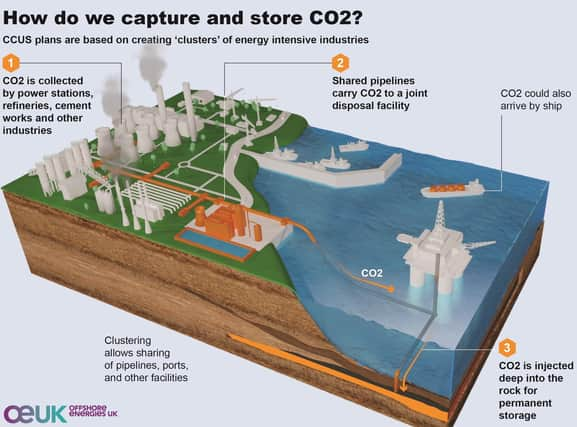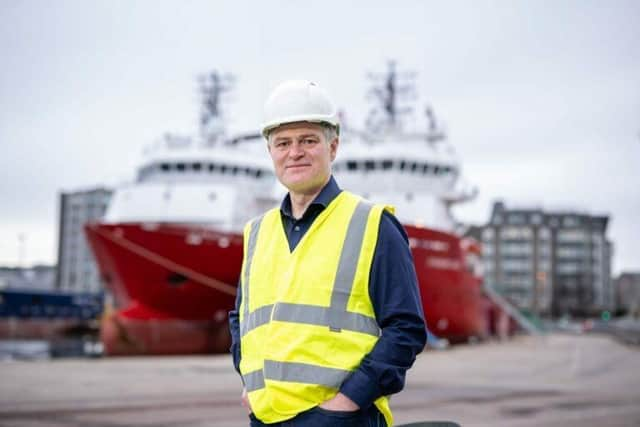Oil & Gas chief: New licences to store carbon dioxide means Scotland could lead the world again – if we grab the opportunity


Scotland's history is interwoven with the legacy of its past and present heavy industries. From iron and steel production to shipbuilding and coal mining, the industries pioneered by Scottish engineers have left an indelible mark on not just Britain but the world. Last week’s announcement of 20 new licences to store carbon dioxide under the UK’s surrounding seas, including off Scotland, means our nation could lead the world again – if we grab the opportunity.
The announcement, from the North Sea Transition Authority, opened 13 areas of seabed covering 12,000 square kilometres for carbon storage. Some lie offshore from Aberdeen and Peterhead with more off England’s northeast coast and in Liverpool Bay. They will be the first of many. The UK needs 100-plus CO2 storage sites to meet its target of cutting net greenhouse gas emissions to zero by 2050 – and many of them will lie off the Scottish coast.
Advertisement
Hide AdAdvertisement
Hide AdBy 2030, the UK wants to be storing 30 million tonnes a year. This would reduce UK greenhouse emissions by about ten per cent, with opportunity to store much more in future. This new technology is controversial. Critics say it will be too expensive to be viable. Some environmentalists oppose it for allowing continuing use of oil and gas. I’ll explain later why we reject those arguments.


Some of the prime sites for permanently burying CO2 will be the depleted reservoirs left by oil and gas extraction, reminding us how the taxes and energy from those North Sea fuels helped turn Scotland and the UK into one of the world’s largest economies. They also supported us through Covid and the shortages caused by the Ukraine conflict. Scotland remains reliant on such fuels – we get 79 per cent of our total energy from oil and gas.
But the emissions from using that oil and gas also cause climate change. My industry, the offshore sector, whose skills turned our North Sea, Atlantic and Celtic Sea waters into the UK’s energy powerhouse, knows that those emissions must be eliminated. Carbon capture and storage (CCS) will be essential in achieving that.
CCS works by capturing CO2 from power stations and energy-intensive industries, compressing it into a liquid and then injecting it into deep rock formations. That summary sounds simple but in reality, the process is complex and requires top-level engineering skills. Scotland can be a world leader here, partly because of our skilled oil and gas workforce, and our geoscience expertise but also because of the UK’s geology.
A potentially huge 78 billion tonnes of natural storage capacity lies in rock formations off our coasts – 190 times greater than the UK’s own annual emissions of around 400 million tonnes. That is enough to store not only the UK’s CO2 emissions but also to help Europe reduce its carbon footprint too.
A CCS industry would mean new opportunities for coastal industrial communities like Aberdeen, Peterhead, Inverness, and Dundee. They were built on energy-intensive industries, but CCS offers them a future leading the low-carbon transition.
Some environmentalists reject such technologies for allowing continuing use of fossil fuels. But the UK has 24 million homes reliant on gas boilers for heat, plus 32 million petrol and diesel cars. Gas-fired power stations generate 40 per cent of our electricity. Manufacturing industries such as steel, cement, glassmaking, and car-making also rely on gas.
There is no credible path in the UK or globally to get to net zero that does not involve CCS. This conclusion is supported by the United Nations’ Intergovernmental Panel on Climate Change and by the UK Government’s Committee on Climate Change – which has said CCS is essential to the UK meeting its climate targets.
Advertisement
Hide AdAdvertisement
Hide AdWhat about cost? Some argue that the energy and equipment needed for CCS will cost so much as to make it uneconomic. It’s true that initial costs will be high – as for any new industry. But 20 years ago, many said the same about offshore wind. Since then, time and technology have turned wind turbines into one of our cheaper forms of power generation. CCS will follow a similar route.
Our biggest enemy, however, is not those who doubt the technology. It’s time. If Scotland and the UK are to secure a first-mover advantage they need to act fast – and our governments need to lead the way, with clear policies and investment incentives. Our supply chain companies, for example, have amazing skills and human resources but they are also vulnerable to political and fiscal uncertainty. If policymakers fail to provide a clear lead, they will be unable to invest in the equipment and people needed to make carbon storage happen.
If that happens then Scotland’s energy transition may still go ahead – but the equipment and infrastructure will be built abroad and imported. That means jobs and value will be created elsewhere.
Some good progress has been made – especially on the Acorn project at St Fergus, near Peterhead, which has advanced plans for a CCS hub. However, Acorn’s bid for support was given ‘reserve status’ by the UK Government in 2021, meaning Storegga, the lead developer, is still waiting to hear if and when it might get funded.
Chancellor Jeremy Hunt’s pledge of £20 billion for CCS in the spring budget was welcome, but what this nascent industry really needs is a long-term vision. Building a domestic carbon capture industry in Scotland and the UK will need investment totalling billions of pounds, and much of that money must come from energy-producing companies.
So, if those new carbon storage licences are to become practical realities our governments must first set out a long-term vision stretching beyond elections. And that vision must include a fair and predictable tax regime that encourages long-term investment not just for CCS but the entire offshore energy sector. The Energy Bill currently moving through the UK parliament will be critical in encouraging investment in CCS.
If we get the investment environment right, then our industry can build the low-carbon infrastructure to hit that net-zero target and turn Scotland into a world-leading centre for low-carbon engineering with high-value jobs throughout our communities. The prize is in sight – we need to move now.
•David Whitehouse is chief executive of Offshore Energies UK (formerly Oil and Gas UK).
Comments
Want to join the conversation? Please or to comment on this article.